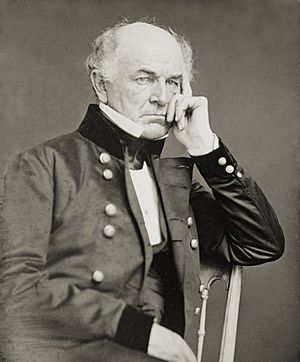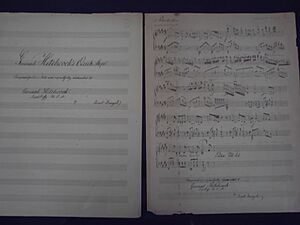Ethan A. Hitchcock (general) facts for kids
Quick facts for kids
Ethan Allen Hitchcock
|
|
|---|---|

Ethan Allen Hitchcock
|
|
| Born | May 18, 1798 Vergennes, Vermont |
| Died | August 5, 1870 (aged 72) Sparta, Georgia |
| Place of burial |
West Point Cemetery
|
| Allegiance | United States of America Union |
| Service/ |
United States Army Union Army |
| Years of service | 1817–1855 1862–1867 |
| Rank | |
| Commands held | Fort Stansbury 2nd Infantry Regiment Pacific Division Department of the Pacific |
| Battles/wars | Seminole Wars Mexican–American War American Civil War |
| Spouse(s) |
Martha Rind Nicholls
(m. 1868; |
Ethan Allen Hitchcock (born May 18, 1798 – died August 5, 1870) was an important officer in the United States Army. He also worked as an author. During the American Civil War, he served as a major general and had important jobs in the War Department in Washington, D.C..
Contents
Early Life and Military Training
Ethan Allen Hitchcock was born in Vergennes, Vermont. His father, Samuel Hitchcock, was a lawyer and a judge. His mother, Lucy Caroline Allen, was the daughter of American Revolutionary War hero General Ethan Allen. People said that Ethan Allen Hitchcock looked a lot like his famous grandfather.
In 1817, Ethan A. Hitchcock graduated from the United States Military Academy (often called West Point). He finished 17th in his class of 19 students. After graduating, he became a third lieutenant in the Field Artillery.
A Career in the Army
Hitchcock was promoted to captain in 1824. From 1829 to 1833, he worked as the commandant of cadets at West Point. This meant he was in charge of the students.
He became a major in 1838. By 1842, he was a lieutenant colonel in the 3rd Infantry Regiment. He was in command of Fort Stansbury.
Serving in Different Wars
Hitchcock fought in the Seminole Wars in Florida. He also served in the Pacific Northwest. Later, he was part of the Mexican–American War. During this war, he worked as General Winfield Scott's inspector general. He marched with General Scott's army on Mexico City.
He earned special promotions for his bravery in battle. He became a brevet colonel after the Battle of Contreras and Battle of Churubusco. He was promoted to brigadier general after the Battle of Molino del Rey.
In 1851, he became the colonel of the 2nd Infantry. From 1851 to 1854, he commanded the Pacific Division. After that, he led the Department of the Pacific.
Leaving and Returning to Service
In 1855, Hitchcock left the Army. He had asked for time off for health reasons, but the Secretary of War, Jefferson Davis, said no. Hitchcock then moved to St. Louis, Missouri. He spent his time writing and studying literature and philosophy.
Hitchcock kept a detailed journal. His writings have been used by historians to understand more about United States history.
Role in the Civil War
When the American Civil War began, Hitchcock wanted to rejoin the Army. At first, he was turned down. But with help from General Winfield Scott, he was made a major general in February 1862. He became a special advisor to the Secretary of War.
From March to July 1862, he led the War Board. This group helped President Abraham Lincoln and Secretary of War Edwin M. Stanton manage the War Department. They also helped command the Union armies when there was no main general in charge.
Hitchcock also served on the court-martial (a military trial) of Major General Fitz John Porter. From November 1862 until the end of the war, he was in charge of exchanging prisoners of war. He then became the Commissary-General of Prisoners.
Hitchcock left the Army again in 1867. He moved to Charleston, South Carolina, and then to Sparta, Georgia.
Personal Life
On April 20, 1868, Ethan Allen Hitchcock married Martha Rind Nicholls in Washington, D.C.
He died on August 5, 1870, at Glen Mary Plantation in Sparta, Georgia. He was buried in West Point National Cemetery in New York.
Studies of Alchemy
By the time he died, Hitchcock had a very large personal library. It included over 250 books about alchemy. This collection was known as one of the best private collections of rare alchemy books. Today, it is kept at the St. Louis Mercantile Library at the University of Missouri-St. Louis.
In his writings, like Remarks upon Alchemy and the Alchemists, Hitchcock suggested that alchemists were actually religious philosophers. He believed they wrote in a symbolic way. Later, a psychologist named Herbert Silberer said that Hitchcock's ideas helped him explore the hidden meanings in alchemy.
Musical Interests
Hitchcock also played the flute. He collected a lot of flute music. In the 1960s, almost 100 years after he died, part of his music collection was found in Sparta, Georgia. This collection has 73 bound books and about 200 loose music papers. It is now at the Warren D. Allen Music Library at Florida State University.
The collection includes music by people who lived at the same time as Hitchcock. It also has music handwritten by Hitchcock himself and some of his personal letters. In 1989, the library celebrated getting these materials with a special concert.
Selected Writings
- Remarks upon Alchemy and Alchemists (published in 1857)
- Swedenborg a Hermetic Philosopher (1858)
- Christ the Spirit (1861)
- The Story of the Red Book of Appin (1863)
- Spenser's Poem (1865)
- Notes on the Vita Nuova of Dante (1866)
- Remarks on the Sonnets of Shakespeare (1867)
- Fifty Years in Camp and Field (published after his death, 1909)
- A Traveler in Indian Territory: The Journal of Ethan Allen Hitchcock, Late Major-General in the United States Army (published after his death, 1930)


